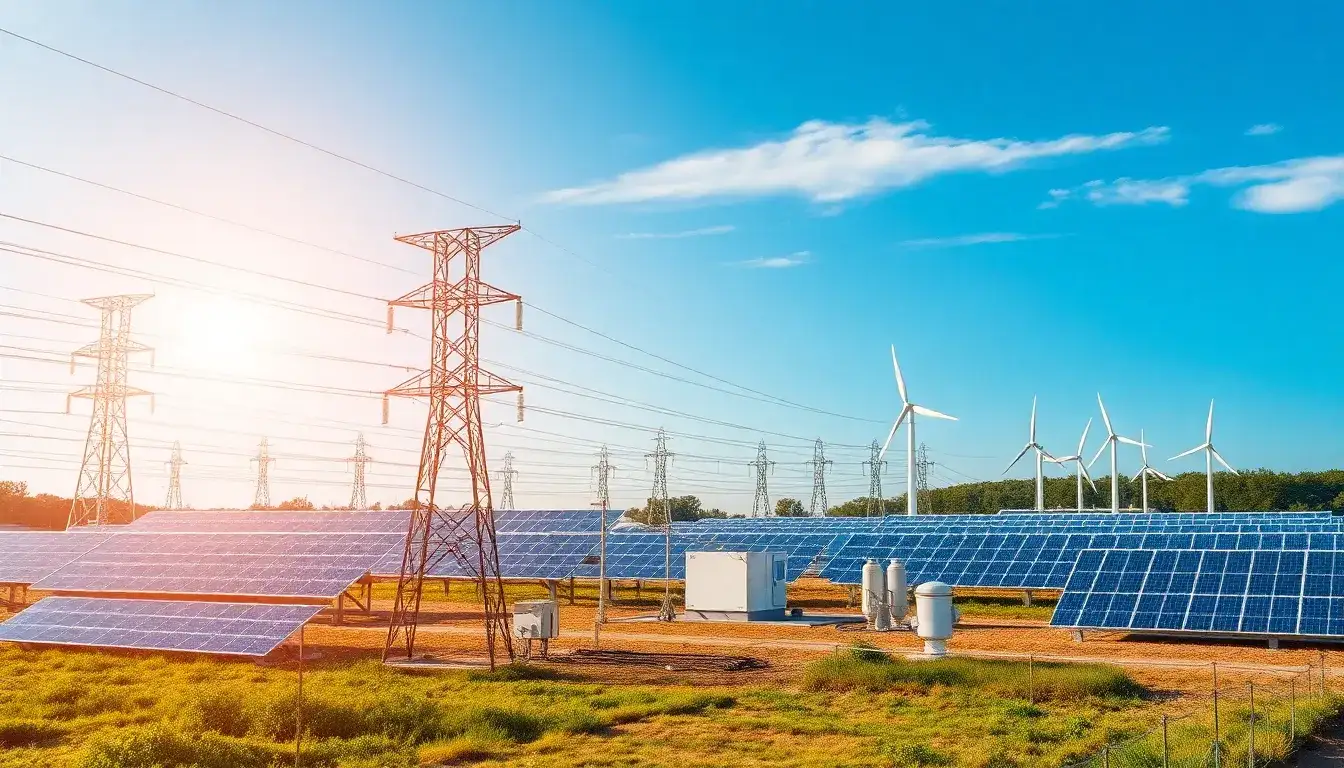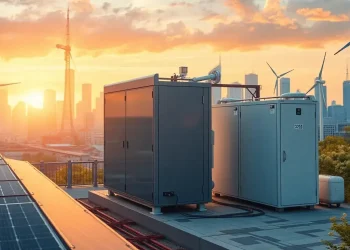
Wang Yingge, Vice President of GoodWe: “Source, Grid, Load, Storage, and Intelligence” Reshaping the Future of Energy
In an interview with China Energy News, Wang Yingge, Vice President of GoodWe Technology Co., Ltd., emphasized that while the photovoltaic (PV) industry has seen a plethora of technological innovations emerging, truly revolutionary and disruptive innovations that can lead the entire sector are still scarce.
Recently, the photovoltaic industry has welcomed new policies. The National Development and Reform Commission and the National Energy Administration jointly released a notice titled “Notice on Deepening the Market-Oriented Reform of New Energy Grid Connection Pricing to Promote High-Quality Development of New Energy” (Document No. 136, 2025). This document calls for new energy grid-connected electricity to participate in market transactions, with prices determined through market mechanisms, and aims to establish a “sustainable pricing settlement mechanism for new energy.” The announcement of this policy has garnered significant attention within the industry.
Wang Yingge commented, “According to the new policy outlined in Document No. 136, although photovoltaic energy is not yet the primary force in the electricity sector, it is moving in that direction. Currently, thermal power has not fully engaged in market-oriented trading, yet new energy electricity is set to begin trading, indicating that photovoltaic energy will play a larger role. We need to thoughtfully consider the future direction of the industry.”
Integration of Solar and Storage is Becoming Inevitable
With distributed photovoltaics participating in electricity trading, the integration of solar energy and storage has become an inevitable trend. “From the perspective of generation characteristics, distributed photovoltaics are affected by sunlight, resulting in unstable power generation. Energy storage can store electricity when sunlight is abundant and release it during cloudy periods, ensuring a stable power supply. Additionally, the combination of distributed photovoltaics and storage can enhance energy self-sufficiency, reduce dependence on large power grids, and increase reliability of electricity supply, even during grid failures,” Wang explained.
Previously, industrial and commercial energy storage projects were mostly independent, with photovoltaics and storage belonging to different operational entities and employing different revenue models, which hindered effective collaboration. This disjointed approach made it difficult to utilize stored energy during low grid prices. Under the new policy, energy storage will serve as a tool for price adjustment, improving the profitability of photovoltaic projects,” he added.
Furthermore, the new policy mandates that the portion of new energy connected to the grid must participate in trading, creating new opportunities for the integration of virtual power plant technology and distributed energy. “Virtual power plants need to aggregate various energy sources for trading, and relying on a single entity for transactions makes it challenging to secure profits. The participation of new energy in market trading creates conditions for the realization of virtual power plants,” Wang acknowledged.
However, he also noted significant challenges ahead. “On one hand, there is the issue of electricity load. The operational state of the load side directly influences electricity consumption, so we need to ensure that the load side can operate stably over the long term during project implementation. On the other hand, aggregating different energy sources will require a comprehensive management model and a smart energy management platform, supported by complex algorithms.”
It is worth mentioning that GoodWe has leveraged its technical expertise in grid systems, the internet, and power electronics to create multiple demonstration projects and is continuously enhancing its AI algorithms to shape its core competitiveness. The company has been positioning itself in the smart energy sector since 2021.
Wang Yingge stated, “GoodWe does not directly engage in virtual power plant operations but provides services and solutions for these plants. We offer hardware support through our inverters, energy storage, and heat pump products, and we are capable of delivering comprehensive EPC solutions.”
Embracing Competition and Efficiency
Wang believes that following the new policies, in order to ensure profitability, the solar and storage industry must further reduce costs. “With the market-oriented trading of photovoltaic electricity, a decline in electricity price revenue is a significant trend. The spot market prices are quite low; even with the inclusion of mid- to long-term prices and mechanisms, they remain modest. Identifying compressible areas within the value chain, such as excessive channels and high development costs, is crucial and will drive channel reform. This will also encourage the emergence of quality companies, while some less competitive firms may exit the residential market,” he remarked.
“From the perspective of inverters, while efficiency has already improved considerably, we continue to work on enhancing it. Furthermore, we need to focus on the long-term reliability of our products, as this can significantly lower the levelized cost of electricity throughout the lifecycle of the power station. For example, GoodWe’s GT series 100—125kW commercial inverters are known for their efficient power generation and robust reliability, finding broad applications in high-safety-demand scenarios such as nuclear power plants and gas stations,” he stated.
He added, “However, grid-tied inverters have matured over the past decade, leaving limited room for cost reduction. The next focus for cost reduction may be in the energy storage sector.” Wang explained, “When we combine photovoltaics with storage, we find that storage occupies a significant portion of the system. The next core area for reducing costs in the solar-storage combination should be the development of energy storage technology and lowering storage costs, while also ensuring the long-term reliability of the equipment.”
“Currently, the basic warranty period for inverters is five years. Following trends in the home appliance industry, future warranty requirements are likely to increase, necessitating more durable and long-lasting equipment. Energy storage products face stricter safety assessments, which must guarantee stable and safe operation, raising technical demands. Ensuring low failure rates and stable long-term operation of equipment will enhance actual utilization hours, thereby reducing costs. Conversely, frequent equipment failures will increase costs and necessitate replacements and maintenance,” Wang concluded.
Developing Towards an Integrated “Source, Grid, Load, Storage, and Intelligence”
Regarding the future direction of energy development, Wang believes there should be an integration of “Source, Grid, Load, Storage” with “Intelligence,” referred to as “Source, Grid, Load, Storage, and Intelligence.” In fact, provinces such as Shandong and Henan have already issued policies encouraging the collaborative development of energy storage with source, grid, and load. GoodWe has long been positioned for one-stop solutions in this area.
Over the past decade, GoodWe has maintained a leading position in the shipment of distributed inverters, with cumulative shipments exceeding 100GW. GoodWe’s “China Red, Photovoltaic Core” has reached thousands of households, and its storage products span from residential to commercial and large-scale storage, offering a rich product line. The photovoltaic building materials are poised to capture a leading market share this year, while its subsidiary Yude can deliver turnkey projects in residential and commercial photovoltaic sectors. GoodWe’s air-source heat pumps have gained popularity in Europe.
The company’s smart energy management platform has connected over 3GW of distributed energy, providing a management platform for local energy investment companies. Wang pointed out that while the photovoltaic industry is witnessing numerous technological innovations, truly revolutionary and disruptive innovations that can lead the sector remain rare. “It appears that everyone is pursuing innovation, but genuine original technological innovation is lacking. The industry needs to settle down and focus on deepening research in photovoltaic, energy storage, and smart energy technologies,” Wang asserted.
He believes that “policies should focus on guiding technology, streamlining grid connection procedures, and reducing external costs, establishing technical standards, and encouraging companies to invest more in R&D to master core technologies, thereby avoiding the phenomenon of ‘bad money driving out good.’







